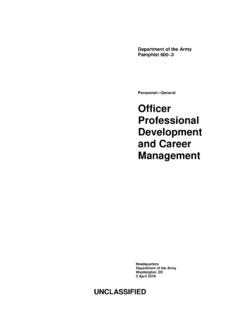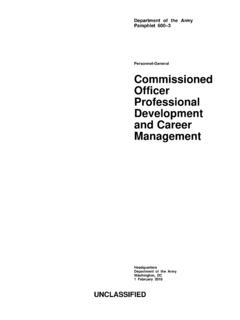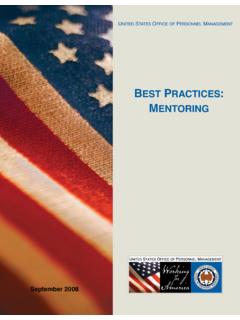Transcription of Relationship between Personality Types and Career Choices ...
1 Journal of Education and Practice ISSN 2222-1735 (Paper) ISSN 2222-288X (Online) , , 2016 102 Relationship between Personality Types and Career Choices of Undergraduate Students: A Case of Moi University, Kenya Rebecca J. Kimongo Kemboi Guidance and Counselling Department, Sosiani High School, Box 1097-30100, Eldoret, Kenya. Nyaga Kindiki Department of Educational Management and Policy Studies, Moi University, School of Education, Box 3900-30100, Eldoret, Kenya. Benard Misigo Department of Educational Psychology, Moi University, School of Education, Box 3900-30100, Eldoret, Kenya. Abstract This study investigated the Relationship between Personality Types and Career Choices of undergraduate students of Moi University.
2 In Kenya, students are allowed to revise their Career Choices at various levels of education before they settle on one course of study in the University. The process of choosing careers begins in form three where students selects subject that would lead them to specific Career . Before the final year in high school they choose University courses they would pursue in the University. After the releases of Kenya Certificate of Secondary Education (KCSE) examination results, they are allowed to revise their Choices . On admission to the University they are given another opportunity to apply for inter-faculty change. Consequently, there is a possibility that students are in Career that are not in line with their Personality Types . The population for the study was undergraduate students admitted by the University Joint Admission Board (JAB).
3 Multi-stage random sampling technique was used to select five schools, and a sample 399 participants. A survey research design was used because the study aimed at assessing relationships among the naturally occurring variables with the goal of identifying predictive relationships. The study was based on John Holland Personality Theory of Career Choice (Holland, 1997). The study used Questionnaires adapted from Holland s Self-Directed Search (SDS) to sort out student s Personality Types , and Holland s Occupational Finder checklist was used to categorize degree programmes into Career Choices according to Holland s Realistic, Investigative, Artistic, Social, Enterprising and Conventional (RIASEC) model. A reliability of of the instruments was established through a pilot study in two non-sampled degree programmes.
4 The data collected were analysed descriptively by use of frequency tables and figures. Chi-square was used to test the null hypothesis at level of significance of Results indicated that there was a Relationship between Personality Types , and Career choice. The study also found that most of the students ( ) are satisfied with their course of study. Research findings will enhance the understanding of Personality Types on Career planning, development and Career guidance and counselling in both secondary school and the University. An appropriate Career choice for students would enhance satisfaction and success in their course of study and future employment. Keywords: Relationship , Personality Types , Career choice, congruence, satisfaction Introduction A Career choice that is compatible with one s Personality type is believed to be reinforced and rewarded by an academic environment.
5 According to Holland s (1997) theory, people seek environments that are aligned with their Personality Types and engage in activities that utilize their abilities. People with low vocational identity are more likely to make incompatible Career Choices and experience frequent Career change than those with high vocational identity. In the context of this study, the study modelled Holland s theory of vocational Personality and work environment where students Personality Types were surveyed according to RIASEC model and related to Career choice. The theoretical preposition being tested in this study is congruence and satisfaction. Congruence refers to Personality type and course of study (environment) that has similar characteristics. Holland stated that people resemble a combination of six Personality Types : Realistic, Investigative, Artistic, Social, Enterprising and Conventional (RIASEC).
6 Personality Types differ according to the activities that are related to abilities and competencies of an individual. Realistic Personality Types have practical, productive, and concrete values. These behaviours lead to competencies in the use of machines, tools, and materials. Investigative Personality Types are associated with analytical or intellectual activities aimed at the documentation of new knowledge and understanding solutions of common problems. Artistic Personality type is associated with the acquisition of innovative and creative competencies such as language, art and music. Social Types have a preference for activities involving working with people to train or help them. These result in competencies in Journal of Education and Practice ISSN 2222-1735 (Paper) ISSN 2222-288X (Online) , , 2016 103 areas such as teaching and counselling.
7 Enterprising Types are often attracted to pursuits that require influencing other. These behaviours results in the development of competencies in leadership and entrepreneurship. Lastly, Conventional Types are attracted to activities such as data manipulation which result in clerical and business competencies. Studies that adopted Holland s theory have found that there is a Relationship between Personality Types and Career choice (Momberg, 2004; McPherson & Mench, 2007; Onoyase & Onoyase, 2009; and Soo, 2010). These studies have been done in other countries but the current study focused on Kenyan context. Soo (2010) suggested that there is need to investigate the role played by Personality Types on Career choice. Mungai (2007) and Schmidt (2001) recommended that a study be done in post-secondary level of education to establish course satisfaction.
8 It is on this note that this study was undertaken to establish the congruence between Personality Types and Career choice as well as course satisfaction. The process of aligning educational requirements with Career Choices has grown in complexity because the world is becoming a global village and the problems surrounding work such as Career decision making, work adjustment and Career education requires more attention than before (Feller, 2003; and Stead and Harrington, 2000). Studies done in America showed that the choosing of careers is a national problem. The studies reported that post-secondary education statistics indicated 20% to 60% of freshmen class to be undecided or uncertain of their Career choice (Feller, 2003; Herr & Creamer 2000; Hayes, 1997; Orndorff & Herr, 1996).
9 In Lebanon, University graduates undertake certain Career paths that mismatch their college majors. Many enrol in Law on temporary basis until they are certain of their Career paths after which they shift to more appropriate majors, resulting in overcrowding in some college majors (Abdul-Reda and Abouchedid, 2003). Research carried out by Institution Policy Analysis Research in Kenya reported that there were no effective Career programmes in Kenya schools because of lack of appropriate policy and acute shortage of qualified and experienced personnel (IPAR, 2003 and Maraya, 2011). Maraya (2011) shows that students in Kenya suffered indecision due to conflicting advice from various sources and concluded that students capacity to make highly informed decision on careers had not been attained as most students had a perception of having moderate information on Career choice.
10 The choosing of careers has remained a constant challenge for students and Career counsellors as they search for a Career decision making process that is both developmentally comprehensive and designed to prepare students for life-long Career planning. Choosing a Career from a large and challenging array of possibilities is a problem to the youth because a lot of attention is paid to academic performance with little information on the link between the subject chosen and future careers (MOEST, 2007). Career Masters have led young people to select careers because it has an attractive feature or is described as glamorous (Machio, 2007). The researcher is of the view that the derailment in Career development is due to lack of Secondary School and University plans that provide students with sound occupational information and self-awareness.














